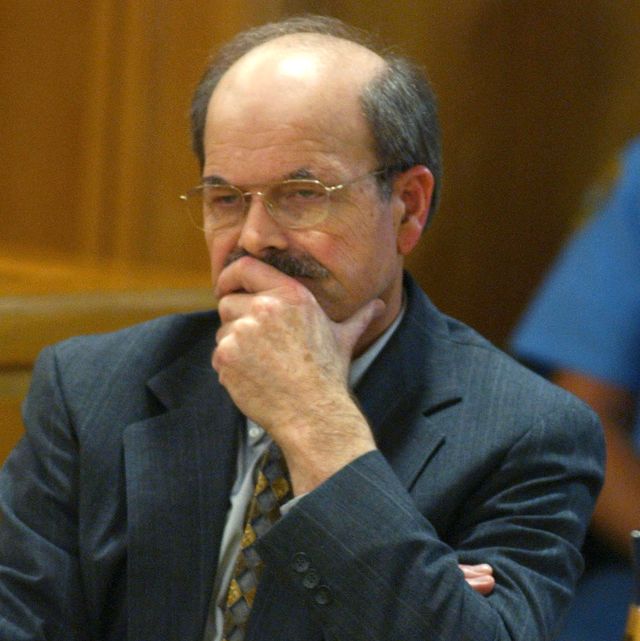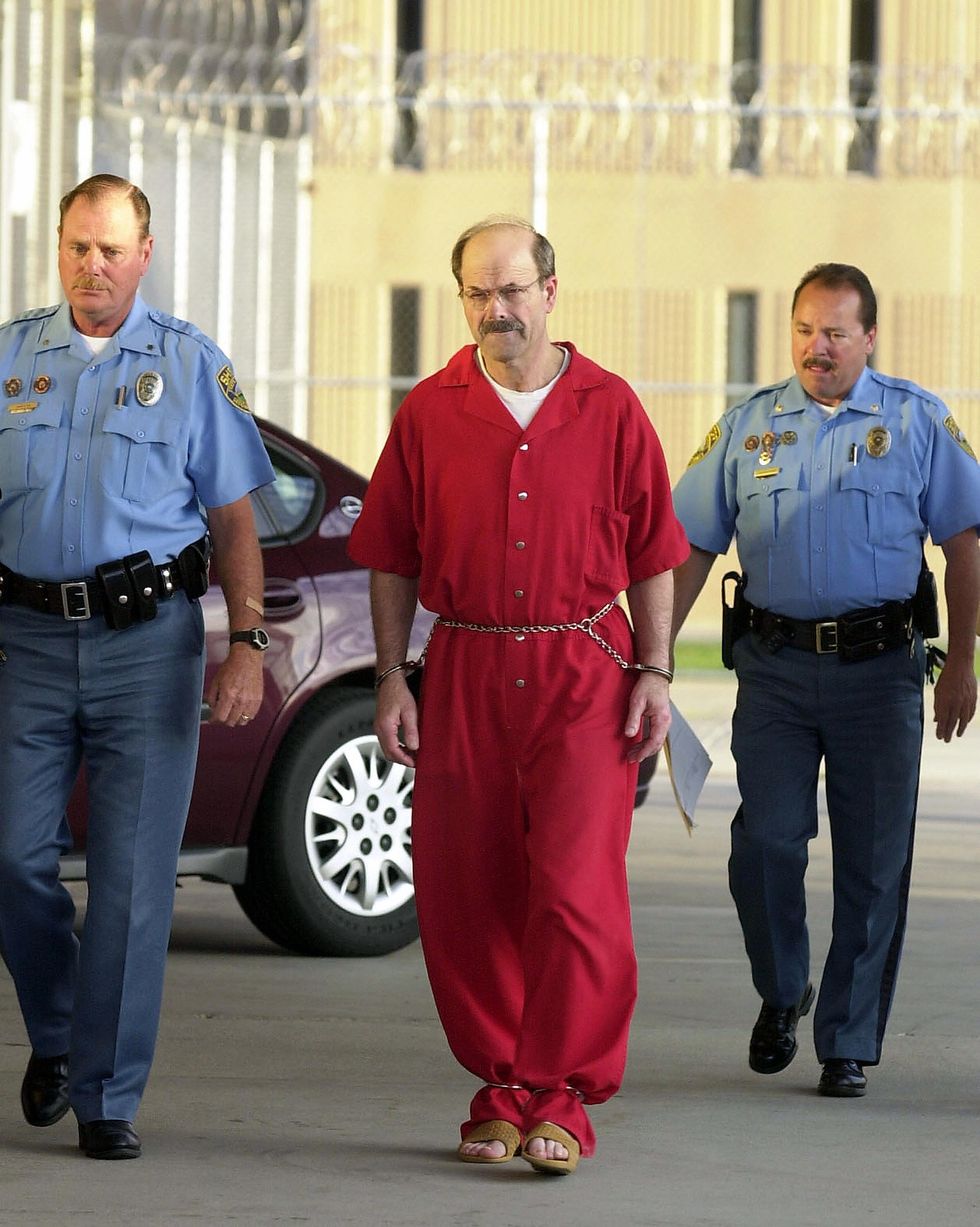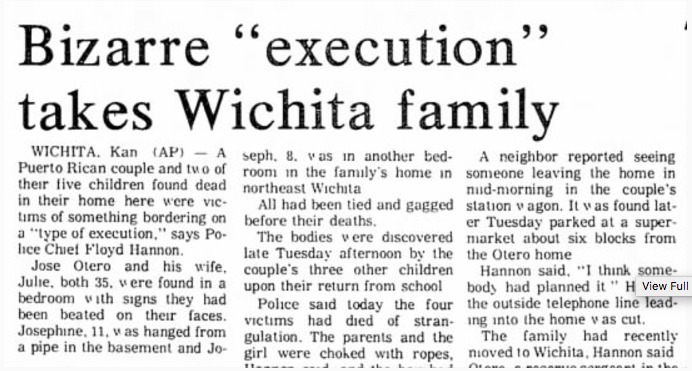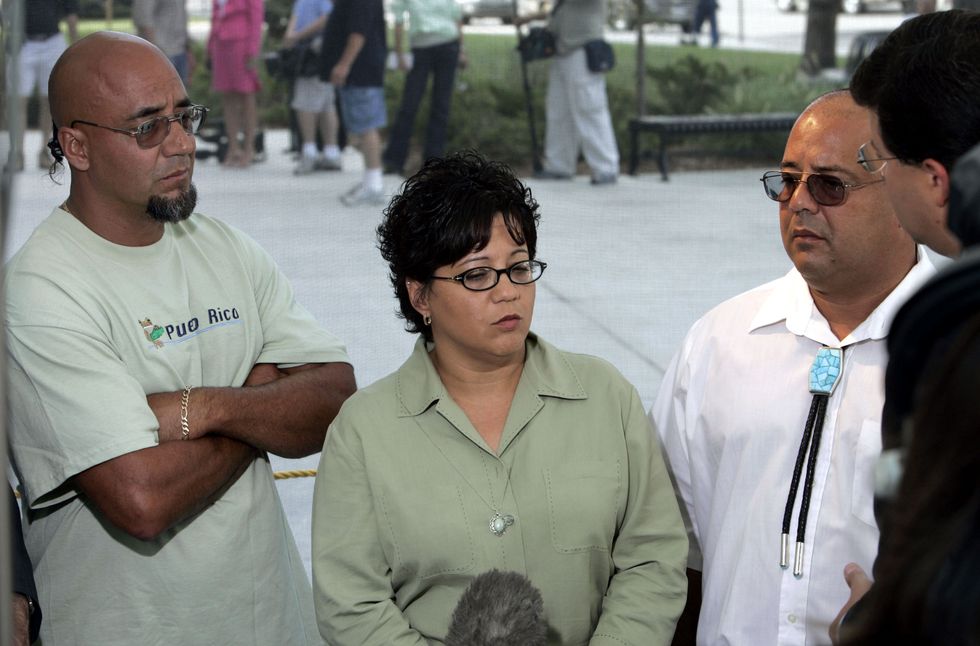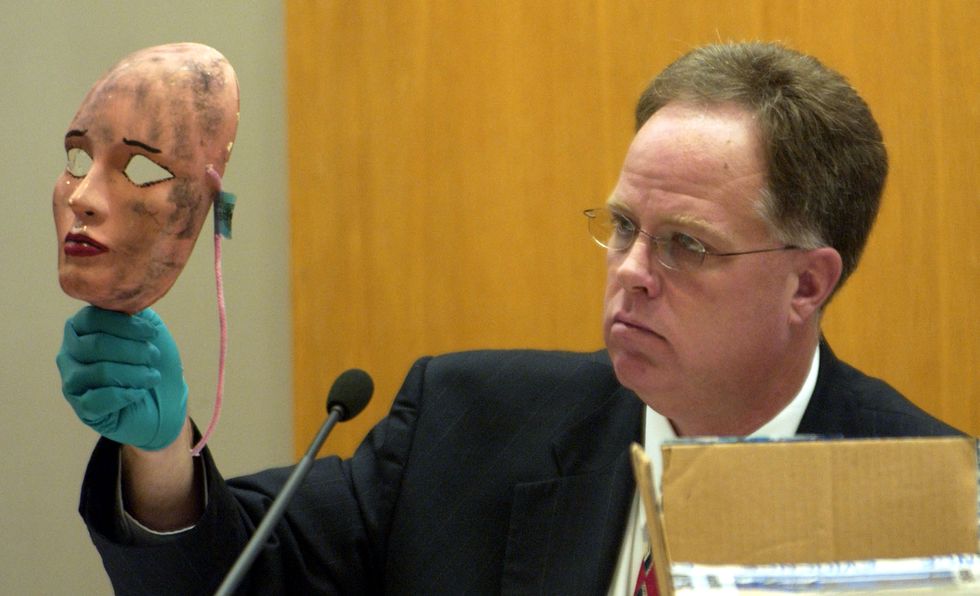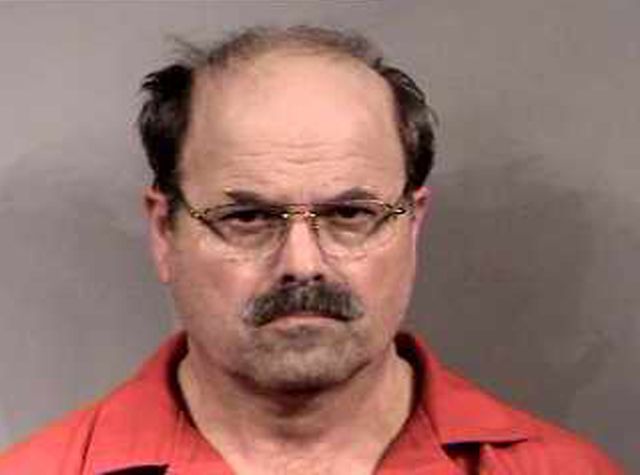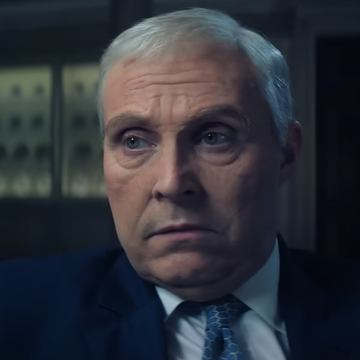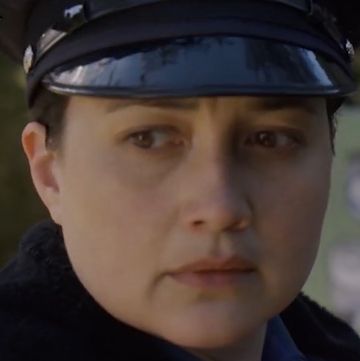For 31 years, a seemingly uncatchable serial killer terrorized residents of Wichita, Kansas. Starting in 1974, he murdered 10 people, taunted police with hints about his next victims, and sent clues of his identity to the media.
His "projects" (as he called victims) were selected at random and included a 9-year-old boy, a 62-year-old grandmother, and a 21-year-old woman. He stalked them, before breaking into their homes and killing them by strangulation, stabbing, or hanging. No one in Wichita knew who'd be next.
With no clear M.O. and nothing linking the victims, the case remained cold for decades. But in 2005, investigators traced a floppy disk from the killer back to Dennis Rader, an unassuming father of two, Boy Scout troop leader, and the local Lutheran church president.
Rader—who called himself "BTK," an acronym for "bind, torture, kill," in letters to the media during his killing spree —is the subject of Snapped, a new two-hour special on Oxygen airing September 2 at 6 p.m. ET/PT. The show includes never-before-heard audio interviews with Rader himself. "I can live a normal life and quickly switch from one gear to the next. I can become emotionally involved," he says in the special. "I can be cold at it. I guess that’s why I survived all those 30 years or 31 years.”
Here's everything to know about Radar's shocking secret life as a serial killer — and where he is now.
From shy kid to cold-blooded killer
Rader was born on March 9, 1945 in the tiny town of Pittsburg, Kansas. He was a quiet child with a dark and disturbing side.
As a teen, Rader would bind his hands with rope and mock-hang himself. He cut out images of women he found arousing from magazines and pondered ways he could physically control them.
"When I was in grade school, I sort of had some problems," Rader says in the Oxygen special. "Sexual, sexual fantasies. Probably more than normal. All males probably go through some kind of, uh, sexual fantasy.
"Mine was just probably a bit weirder than other people."
After spending time in the Air Force, Rader took a job at ADT Security Services to install residential and commercial security systems, per PEOPLE, where he learned how to disable home-alarm systems — a skill he'd later utilize to break and enter into victim's homes.
He met his wife Paula, a bookkeeper for Snacks convenience store, at church and proposed marriage after only a few dates. They wed in May 1971, three years before he committed his first murders.
The first of many murders
On January 15, 1974, Rader's dark fantasies turned into real-world action. That morning, he forced his way into the Wichita home of the Otero family after spotting them in their driveway. He confronted parents Joseph and Julie Otero, a young couple in their 30s, with a gun before suffocating Joseph with a plastic bag and strangling Julie with a rope.
“I had never strangled anyone before,” Rader later confessed during a court hearing, CNN reports. “So, I really didn’t know how much pressure you had to put on a person or how long it would take."
"I tried to make Mr. Otero as comfortable as I could," he added. "Apparently he had a cracked rib from a car accident. So I had him put a pillow down for his head... I realized that I was already, I didn't have a mask on or anything. They already could ID me. And I made a decision to go ahead and put them down, I guess, or strangle them."
Then, he killed the couple's two youngest children, 11-year-old Josephine and 9-year-old Joseph.
Their older brother Charlie discovered the bodies when he returned from school that afternoon. Joseph was lying next to the bunk bed in his room, dead with ligatures around his neck, and Josephine was in the basement hanging from a sewer pipe. There was dried seminal fluid on the floor.
The next morning, the front page of the local paper read: “Bizarre Execution Takes Wichita family.”
The terror continues
Three months later, the body of 21-year-old Kathryn Bright was found in her home. She was bound with a cord, partially dressed, and had been stabbed several times in the abdomen and strangled, according to CNN. Her brother, Kevin, was shot but survived.
In October 1974, The Wichita Eagle received a strange phone call from a man claiming to be the killer. He directed them to look inside an engineering book at the Wichita Public Library, where he'd stashed a shocking letter, signed "BTK." It described the murders in great detail and announced that he, the "BTK" killer, would strike again.
Three years later, on March 17, 1977, Rader forced his way into the home of 26-year-old mother Shirley Vian. He locked her 5-year-old son, Steve Relford, in the bathroom with toys and blankets. Steve, peeking through the door, watched as Rader strangled his mom with a rope.
Rader, who had sickening aspirations to become a notorious serial killer, wrote to local media dropping hints about his next victims and imploring them to cover his crimes. In one note, he said: "How many do I have to kill before I get my name in the paper or some national attention?"
On December 8, 1977, Rader strangled 25-year-old Nancy Fox with a belt. Over the next 14 years, he killed three more.
Cub Scout leader, church president, and notorious serial killer
As Rader murdered innocent people — evading police and taunting media and police with clues— he led a relatively quiet family life in Wichita with his wife, Paula, and their two children, Kerri and Brian. He headed his son's Cub Scout troop and was active at his Lutheran church.
The kids held no suspicion that their father was a serial killer, but do recall his random, violent outbursts.
In a 2015 The Wichita Eagle article, Kerri remembers her family getting into "some kind of argument at dinner, and we had this old rickety table and someone—I don’t remember who—pounded on it and the legs broke and all the dinner came crashing down, scattering noodles and sauce all over.
“My dad was so angry at my brother, he put his hands around my brother’s neck and started to try to choke him. My mom and I stepped in right away and broke it off.
“I can still picture it clearly, and I can see the intense anger in my dad’s face and eyes. Close to manic.”
Kerri says she feels "bad" for the "30 years of shit" her dad gave Wichita residents.
"30 years of bad things because of one man, my dad," she told The Wichita Eagle. "The terrible things, he did to the victims... Women were scared, my own mother was scared to go home."
DNA downfall
Following BTK's final murder of Dolores Davis in January 1991, the killer seemed to disappear. In 2004, The Wichita Eagle published a feature speculating that the killer was either dead or in prison. In response, Rader crafted a series of letters and puzzles to media and police, taunting them with clues about his identity.
In January 2005, KAKE TV received a letter from BTK about a cereal box he left in the back of a truck parked at a Home Depot. Inside were documents taunting police with descriptions of planned murders, and a document with a question for investigators: Would it be secure to communicate further with them through a floppy disk?
"Be honest," Rader wrote. He then instructed police to place an ad in the newspaper with the message, "Rex, it will be OK," if it was safe. Investigators ran the ad and two weeks later, a package containing a floppy disk arrived at a TV station in Wichita.
The disk was traced to Christ Lutheran Church in Wichita. Through new DNA testing, police were able to confirm that Rader was, in fact, the BTK killer. He was arrested on February 25, 2005.
A life sentence
On August 18, 2005, Rader was sentenced to to a minimum of 175 years without a chance of parole. The sentence was the longest allowable; Kansas had no death penalty at the time of sentencing.
At the sentencing hearing, Jeff Davis, the son of Dolores Davis, lashed out at his mother's killer, calling him "a depraved predator."
"If I were to sink to your level," said Davis, per ABC, "I would say that this world would have been much better off had your mother aborted your demon soul before you were unleashed on this world, sparing 10 innocent lives and avoiding untold heartache for this community."
Rader's wife divorced him immediately after his 2005 arrest and their daughter, Kerri, rarely communicates with him, and only via letters. She's penning a book titled 'A Serial Killer's Daughter: My Story of Faith, Love, and Overcoming,' that will be out in January 2019.
Rader remains at the El Dorado Correctional Facility and his earliest possible release date is 2180, per The Wichita Eagle. He recently had a cancer scare, which prompted him to make plans to write a will.
“I did write Kerri and ask her and the family if they would like my left-over art, poetry, papers, log books, journal, etc.,” Rader said in a letter to the publication last year. “I gave them a couple of months to decide. I thought perhaps Kerri might like to work with someone to 'chap book' or a bio on me.”
She responded with a comment to the Eagle: “He’s talking about his own death. But he’s been dead to my mom for 12 years.”
With the release of Oxygen's special in September, Rader's sick desire for fame continues continues to come true. In the special, he claims to feel some remorse for the families of his victims. "I know that it’s something I wouldn’t want to happen to my family," Rader tells KAKE TV reporter Larry Hatteberg in the never-before-heard 2005 audio interview, obtained by Oxygen. "You know I could be in the same shoes. So I, you know, I feel for them. Even right now it kind of cracks my voice a little bit.”
But, he admits, he was already stalking his next victim, when he was caught by police. "There was probably one more I was really thinking about it," he says. "There was one already picked out.”
